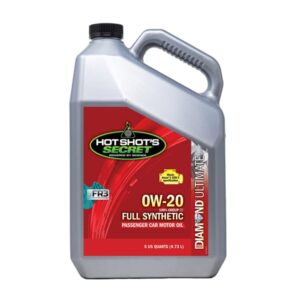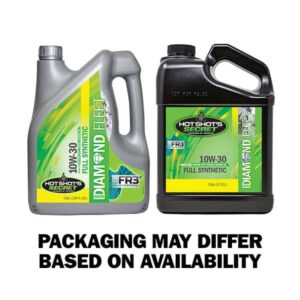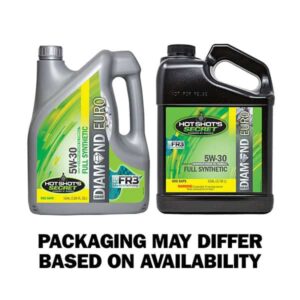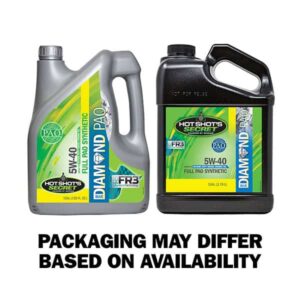
From a cleaner engine to reduced friction, synthetic oils improve engine functionality. As industry standards evolve in pursuit of efficiency and sustainability, synthetic oils have emerged as an alternative to conventional oils, engineered to meet the demands of modern-day commutes. Explore what a synthetic motor oil is, how it outshines its traditional counterparts and why you should consider it for your vehicle.
What Is Synthetic Oil?
Synthetic oil is artificially produced to achieve specific characteristics, such as a high-performance engine oil with enhanced wear protection.
Because of its unique characteristics, synthetic oil was first formulated for specialized carriers. Today, oil companies produce synthetic oil to support a range of vehicles that drivers use for everything from day-to-day commuting in cars to cross-country road trips in RVs. For many people, synthetic engine oil is a hallmark of mainstream vehicle protection.
Types of Synthetic Engine Oils
There are two main types of synthetic oils.
What Is a Fully Synthetic Oil?
A fully synthetic oil uses only a synthetic base and a mixture of high-quality additives to produce an oil with impeccable characteristics. Fully synthetic oils support drivers in a wide range of needs while offering all-around protection.
What Is a Synthetic Blend?
Like the name suggests, a synthetic blend is an oil mixture. Instead of one kind of oil, a synthetic blend combines a conventional or standard oil with a synthetic base stock. This mixture may also be called a semi-synthetic oil. The mixture improves the functionality of the oil, allowing it to offer more benefits than standard purified crude oil would.
What Is in Synthetic Oil?
The exact formula and its contents depend on the oil you select. In semi-synthetic oils, you will find mineral oils and a percentage of synthetic oils. These oils result from the collaborative effort between group II and group III base oils, which are highly purified.
Fully synthetic motor oil primarily encompasses groups III, IV and V base oils. Group IV contains polyalphaolefins (PAOs), which have a structure similar to the hydrocarbon found in mineral oil. Group V includes esters, such as diesters and polyol esters. These fully synthetic oil formulas also contain additives.
How Is Synthetic Oil Made?
The process of producing fully synthetic oil varies with the manufacturer, but all formulas begin with a base oil and a selection of additives intended to improve performance and longevity.
A key step for oil manufacturers making synthetic blends is an intense hydrogen purification process called hydrotreating or hydrocracking. Hydrotreating is a conversion process in which crude oil is exposed to hydrogen and catalysts to remove impurities like sulfur and nitrogen. This step produces cleaner oil with better engine protection capabilities.
Group III
New molecules, namely hydrocarbons, result from this cleaning process. This new molecule formation process earned group III base oils a place among the synthetic oil group. The formation of new hydrocarbons with uniform molecules supports a higher viscosity index, meaning the oil maintains its thickness at different temperatures to offer better vehicle protection.
Group IV
However, oils made from group IV polyalphaolefin base oils follow a slightly different process. PAOs are produced using ethylene, which manufacturers extract from natural gas or crude oil. Ethylene is a pretty simple, short-chain hydrocarbon. Through polymerization, the short-chain ethylene molecules are linked to create more complex molecular structures. This formation process results in an oil with a higher purity level that is useful in various applications involving extreme temperatures.
While they are also synthetic lubricants, group V oils are not used as frequently for engine oil.
Performance Characteristics of Synthetic Oil vs. Conventional Oil
There are several differences to note between conventional oil and synthetic oil. Most of them result from the varying molecular structures, but they impact your engine’s performance.
Higher Viscosity Index
Synthetic engine oils are manufactured to have a better viscosity index. Viscosity describes the thickness of your oil, and the viscosity index identifies how much the oil’s thickness changes with temperature fluctuations.
A higher index means they flow faster and smoother in cooler temperatures compared to regular oils. When you find yourself in high-temperature climates, the oil will maintain its viscosity. Instead of running like water and compromising your engine, it will retain a thicker film that can provide high-level protection.
A Cleaner Engine
If you have ever used conventional oil, you know that mineral oil forms sludge. This gelatinous substance can adhere to your engine and hinder oil flow. Fortunately for synthetic oil users, buildup is one of the core areas where synthetic oil triumphs over conventional oil. Most oil companies will infuse synthetic oils with additives that offer a detergent effect in your engine, reducing dirt deposits and combating sludge formation.
Better Shear Resistance
Thanks to their strong and stable molecular formation, synthetic oils offer better shear resistance. Even after being exposed to high temperatures and pressures and pulled apart in the engine, synthetic oils will not easily suffer viscosity breakdown. They can retain their molecular integrity for much longer than conventional oil.
Improved Oxidation Resistance
The molecular structure of synthetic oils also improves oxidation resistance. Due to their strong hydrocarbon molecules, synthetic oils are stable. Their molecular stability makes them less likely to accommodate oxygen atoms.
However, conventional mineral oil has varying molecules with different structures and sizes. These inconsistencies create openings for oxygen to slip in and encourage corrosion formation.
Better Engine Performance
Most of today’s vehicles feature smaller engines with turbochargers, which produce extreme heat and pressure. Conventional oil can easily experience a chemical breakdown, compromising the security of integral engine components. Synthetic oil is designed to keep your turbocharger clean and cool, allowing it to protect your vehicle for longer.
Mileage Benefits of Synthetic Oil vs. Regular Oil
Fully synthetic oils offer far better mileage. Since the oil has a higher viscosity index, it provides frictionless operation, resulting in improved fuel economy. Regular, conventional oil, on the other hand, can be thicker, requiring more energy to push it through the engine. This heavier lift can easily result in increased fuel consumption.
How Long Does Synthetic Oil Last?
If your vehicle uses synthetic oil, you may need to schedule an oil change at least once a year, or after 10,000 to 15,000 miles. However, engines with conventional oil may need oil changes more frequently. Some manufacturers suggest changing conventional oil every 3,000 to 7,500 miles.
A good practice is always checking your owner’s manual to know your recommended oil change interval. However, some oils have been engineered to provide lasting protection, greatly exceeding the manufacturer’s suggested period. Oils, like our Blue Diamond PAO Synthetic oil, can last three times the change interval indicated by the original equipment manufacturer.
If you want to extend how long synthetic oil can last, then there are a few practices you can try.
- Limit engine idling: Whether in traffic or waiting in line at a drive-thru, idling can strain your engine, demanding that your oil work harder than it normally does. Limit idling where you can to extend the life of your oil and battery.
- Get an oil analysis: Sending your oil sample for preventive maintenance fluid analysis is an easy way to review the state of your engine oil and the overall health of your engine.
- Purchase quality: Quality oils extend oil change intervals. Oils like Hot Shot’s Secret Red Diamond Passenger Motor Oil do more than just limit metal-to-metal contact, offering superior performance where you need it most.
Choosing the Right Synthetic Oil for Your Vehicle
One thing is clear — synthetic oils are a great option for modern vehicles. If you drive an older model vehicle, ask your manufacturer for a backward compatible option that can breathe enhanced performance into your engine.
Which oil is best for your vehicle? Here are a few things to keep in mind when searching for the right oil:
The Type of Vehicle
The vehicle you drive can determine the type of oil you purchase. If your engine runs on gasoline, you want oil specifically designed for gasoline vehicles. If it runs on diesel, you want an oil clearly labeled for diesel.
Manufacturer’s Recommendations
Your owner’s manual will specify the type of oil to purchase for different parts of your vehicle. Some vehicle manufacturers, like General Motors (GM), are very oil-specific. In 2010, GM created a set of tests to determine oil compatibility with GM engines. For example, they have dexos1, which they use to test oils for their gasoline vehicles, and dexosD for diesel.
Driving Conditions
What are the normal climate conditions for your area? Climate can play a role in the kind of oil you should purchase. If you drive in extremely cold conditions, you will need an oil with a low viscosity index, like a 0W-20. If you drive in warmer climates, you want an oil with higher viscosity, like 15W-40.
Shop Quality You Can Trust
At Hot Shot’s Secret, we provide top-quality synthetic oils. Our line includes semi-synthetics and fully synthetic oils engineered to offer exceptional performance that supports your commute, your way.
Hot Shot’s Secret started with a simple mission to solve a problem. More than two decades later, we have quality automotive products backed by science. Explore our synthetic oils and place your order today.
FAQs on Synthetic Oil
What is the difference between fully synthetic oil and a synthetic blend?
Fully synthetic oil uses only a synthetic base combined with high-quality additives for comprehensive protection and superior characteristics. A synthetic blend, also known as semi-synthetic oil, combines conventional mineral oil with a percentage of synthetic base stock to improve its overall performance and functionality.
How long does synthetic oil typically last compared to conventional oil?
Vehicles using fully synthetic oil may require an oil change less frequently, typically once a year or every 10,000 to 15,000 miles. In contrast, conventional oil usually requires changes more often, generally every 3,000 to 7,500 miles, but you should always consult your owner’s manual for specific recommendations.
What is a “viscosity index” and why is it important for synthetic oil performance?
Viscosity describes the thickness of your oil, and the viscosity index measures how much that thickness changes with temperature fluctuations. Synthetic oils are designed with a higher viscosity index, ensuring they flow faster in cold temperatures and maintain a protective film in high temperatures, preventing breakdown and offering high-level protection.




